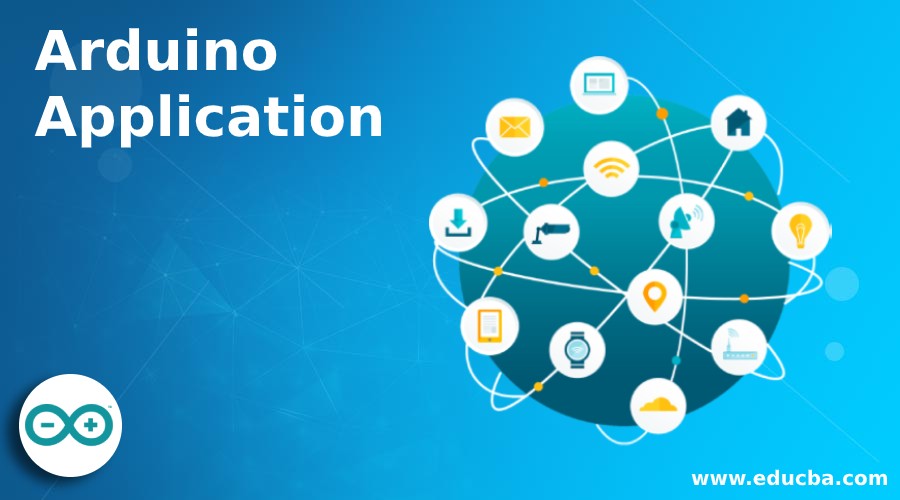Updated July 3, 2023
Introduction to Arduino Application
In the traditional world, computers were utilized for processing payroll, managing accounts, and maintaining inventory records primarily for business applications. These computers comprised mainframes, minicomputers, and super minicomputers, each comprising separate units for the central processing unit (CPU), memory, physical storage, and controlling functions. Then came personal computers on the desk with office Arduino Applications for day-to-day activity and also acted as a client to the servers for data and other services.
In the digital world, computers play a crucial role in connecting various objects or devices. They receive inputs from the operating units of these objects, control their operations based on the inputs received, and transmit the collected data to a central system for further processing. These objects can be stationary or in motion.
What is Arduino?
Arduino belongs to the embedded systems family, and let’s discuss it in detail about it:
Arduino is a company specializing in hardware and software. They manufacture the Arduino Uno board, an open-source platform used as a digital device to control the operations of any equipment. Arduino board is basically a single-board microcontroller with a microprocessor and I/O points.
Arduino development started in 2005 with the intention of providing cheaper, economical digital tools to students to work on digital projects as the cost of Microcontrollers in the market was costly then.
Arduino licenses are available as general public licenses (GPL) or lesser general public licenses (LGPL), enabling many people to design their own boards and redistribute them. This product is available as a ready-to-use assembled product and as a kit to assemble it yourself (DIY).
Software Development
The development has to happen externally to the Arduino board using an integrated development environment (IDE) exclusive to Arduino, and it runs on cross-platform OS viz., Windows, Linux, and Macs. It mainly supports Java language and C and C++ with some special conditions attached to it.
This IDE has a Software library that provides reusable input-output procedures to make coding simple, and it provides easy editing facilities like Cut and Pastes, Search functionalities, indenting, highlighting, brace matching, and a single click saving, compiling, pushing the program to Arduino processor. The compiled code can be moved to the processor manually using a USB cable and copy command. Pro IDE offers a much better professional environment with Git integration (version control), auto-completion facilities, new libraries, and many more modern features.
Unique features of Applications in this platform
The success of Arduino applications accelerated the implementation of many IoT projects in shop floor automation and the march toward manufacturing 4.0. The application is not restricted only to business applications; it cuts across business borders to reach the common man. Applications affecting daily life are taken as use cases and addressed in this application, improving lifestyle.
Public and Social causes are also taken up as use cases, and applications are developed. It adds a way of improving social life and living
Arduino Applications
Below are the Arduino Applications:
Home Automation
This application uses the Arduino Uno board, Bluetooth interface for connectivity, and smartphones. Operations like switch on, switch off, increasing or decreasing the intensity, volume, and other operating parameters of these devices. These applications simplify the operation of household gadgets and enable better control.
Public Utility Automation
In street lighting, engineers fit Arduino boards and sensors into the street lights. The microcontroller is responsible for reading inputs from the sensors regarding light levels and temperature changes. Dynamic traffic Management Arduino controller and infra-red sensors help manage the traffic dynamically. Input from the sensor helps the controller measure the traffic volume and accordingly control the timing of signals per the traffic flow and direction.
IoT
The Poka-yoke system ensures that operators install the correct component at each assembly line stage. Arduino board based on the input from the central server send a signal to the right bulb in the circuit and illuminates it. Arduino board takes the signal from the sensor and adds it to the count, and sends the data back to the central server.
Conclusion
Arduino provides an inexpensive solution when compared to other microcontrollers. The development environment is compatible with Windows, Mac, and Linux operating systems. This platform is open-source, making it highly accessible and enabling students to develop pilot projects and explore new technologies.
Recommended Articles
This is a guide to Arduino Application. Here we discuss an introduction to Arduino Application, what it is, its features, and some applications. You can also go through our other related articles to learn more –




